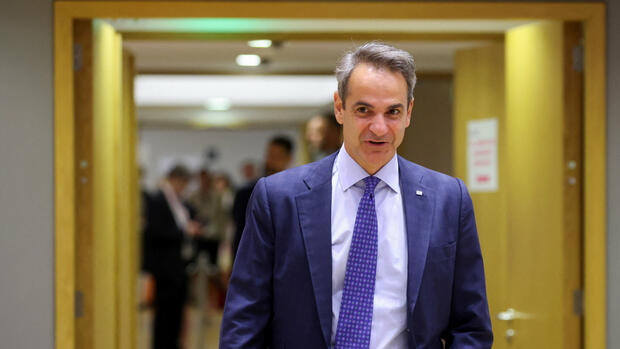The Greek Prime Minister declares war on tax evasion.
(Photo: Reuters)
Athens During the Greek election campaign, all sorts of things were talked about, but one word never crossed the lips of any politician: tax evasion. It is considered one of the causes of the Greek sovereign debt crisis, which almost plunged the country into bankruptcy in the 2010s.
And yet the topic was taboo at the election rallies. Because many votes cannot be won by chasing tax evaders. Tax evasion is too widespread for that.
Now, after his re-election, the conservative Prime Minister Kyriakos Mitsotakis is changing course: the fight against tax evasion should be one of the priorities of the new government. The new Economics and Finance Minister Kostis Chatzidakis wants to raise tax morale with an eight-point plan.
Undeclared work is widespread in Greece, even among doctors. A study by the Institute for Applied Economic Research at the University of Tübingen from February 2023 puts the size of the shadow economy in Greece at 21.7 percent of the officially determined gross domestic product (GDP). Among the OECD countries, the rate is only higher in Italy, at 21.8 percent. For comparison: Germany is in the middle with 10.2 percent.
If you believe the tax returns, there are almost no rich Greeks. Of the 6.5 million taxpayers, only around 27,000 reported annual incomes of more than 100,000 euros in 2022. Two out of three taxpayers declare annual income of less than 10,000 euros.
Mitsotakis wants to distribute the tax burden in Greece more fairly
In his first government statement since being re-elected, Prime Minister Mitsotakis has now declared his fight against tax evasion. He will no longer accept “that the tax burden is unfairly distributed on the backs of all those who cannot hide their income”.
>> Read here: Kyriakos Mitsotakis is speeding up reforms
Mitsotakis warned tax evaders: “Therefore, I am telling you very clearly that this government has both the political legitimacy and the will and know-how to identify you and compel you to do the obvious thing, which is to pay the taxes which correspond to your actual income.”
Economics and Finance Minister Chatzidakis is also putting pressure on: He sees the fight against tax evasion as “a very personal mission”. With his Deputy Minister Charis Theocharis, who is responsible for taxation, he has a comrade-in-arms who knows the subject well: ten years ago, as Secretary General of the Ministry, Theocharis pushed ahead with the digitization of financial administration.
The economics and finance minister wants to ensure that the Greek state no longer loses out on enormous income through tax evasion.
(Photo: IMAGO/ANE Edition)
With a package of measures, the Ministry of Finance wants to ask tax evaders to pay. This doubles the number of tax audits.
The most important tool in the fight against tax evasion is card payment. The Greeks still carry out the majority of their transactions with banknotes, despite a cash limit of 500 euros.
Central bank governor optimistic about fight against tax evasion
In private consumption, the proportion of card payments has increased from 20 to 37 percent since 2019. However, it is still well below the euro zone average of 46 percent. Professional groups such as craftsmen, doctors and lawyers should be obliged to accept card payments.
The card terminals are networked with the tax authorities via the mobile network, which uses them to register all transactions in real time. Minister Chatzidakis also wants to offer consumers incentives to make cashless payments, for example with higher tax allowances.
>> Read here: Card payments could help Greece reduce its debt
Greece’s central bank governor Yannis Stournaras is optimistic. “The key is digital, cashless payments,” he believes. Stournaras devoted an entire chapter to the issue of tax evasion in his most recent annual monetary policy report.
The head of the central bank gives astonishing figures: the private annual income declared to the tax office in Greece amounted to around 80 billion euros in 2021. However, private consumption reached 140 billion. According to Stournaras, the difference of 60 billion is untaxed income. The head of the central bank put the loss for the Treasury at 18 billion euros.
That would be 30 percent of last year’s tax revenue. The conclusion of the Athens central banker: “In Greece practically only employees and pensioners pay income tax. That needs to change.”
More: How Greece makes tax revenue from black money
